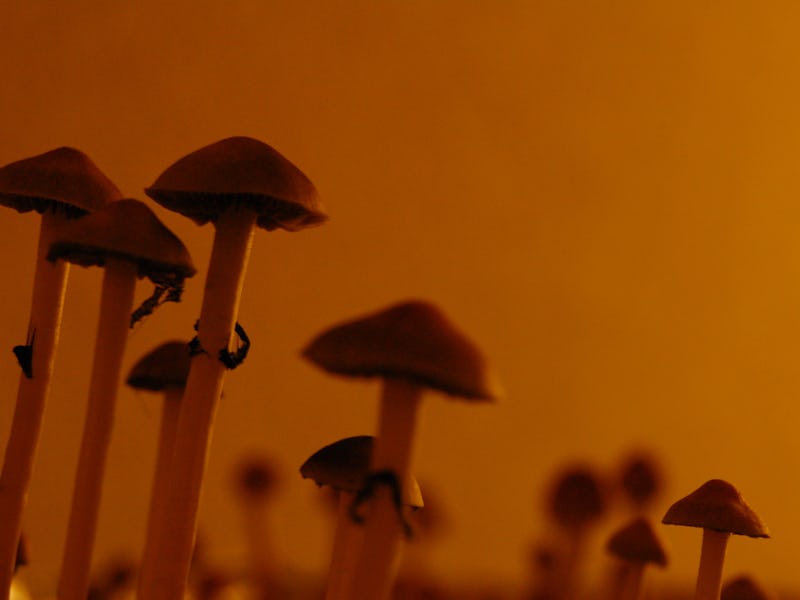The Latest Prescription Psychedelics Idea? Treat Addiction With Magic Mushrooms
Psilocybin has been shown to help addicts, but will the stigma of drug addiction halt research?

Psilocybin, the substance that gives magic mushrooms their magic, is a drug with enormous potential. In recent years a new wave of research of therapeutic uses of psychedelics has risen, and early results are nothing short of astonishing.
A single dose of psilocybin, administered in a controlled environment with the support of talk therapy beforehand and afterwards, has reduced anxiety and depression in cancer patients, and cured smokers of their addiction. In a recent Johns Hopkins University study, 80 percent of heavy smokers treated with the drug were still cigarette-free six months after treatment. The best nicotine treatments available on the market today, on the other hand, have success rates of just 20 percent. A variety of conditions related to psychological distress — including addiction, obsessive compulsive disorder, anxiety, depression, and PTSD — have been alleviated, if not cured, by magic mushrooms.
Despite this, psilocybin remains a Schedule 1 controlled substance — by official definition, it has a high potential for abuse, is not useful as a medical treatment, and is not safe even when administered under doctor supervision.
There’s a groundswell, though, of doctors, researchers, therapists, enthusiasts, and activists who are pushing for legalization of psychedelics and acknowledgement of their potential for good. The good news is that these individuals and groups are dedicated to the cause, and committed to following through until they reach their goals. The bad news is that getting any new medical therapy through the regulatory hoops is a massive, expensive, time-consuming endeavor, and the hurdles are magnified many times over for psychedelic drugs.
The Heffter Research Institute is currently planning Phase 3 clinical trials for using psilocybin to ease anxiety and depression in patients with cancer. It’s a big undertaking, expected to cost millions of dollars and take several years. The money will be raised from multiple sources, including philanthropists and possibly crowdfunding, Dr. George Greer, co-founder of the institute, told Inverse in an email.
Pharmaceutical companies have no interest in psilocybin because it can’t be patented. Also, patients appear to have their symptoms go away for months or years after a single treatment, and it’s difficult to make money off a drug that does not require regular use.
The Phase 3 trials will involve hundreds of patients across the country. If they are successful, the Food and Drug Administration will be under a great deal of pressure to approve psilocybin for treatment of anxiety and depression in cancer patients. And the Drug Enforcement Administration will have to change the drug’s categorization under the Controlled Substances Act. But if you decide to go harvest some wild magic mushrooms, you could still go to jail.
“It will still be illegal to use outside of medical treatment, and FDA will have considerable authority to limit its use,” says Greer. “But there is no way to predict what those restrictions might be at this point.”
And if you want to use magic mushrooms to ease your addictions to nicotine, alcohol, and other substances? The day that you can get a prescription for that will likely one day come, and hopefully before you need psilocybin to treat your lung cancer-related depression. “Based on the surprisingly positive results from the pilot studies for alcohol and nicotine, I do believe it will,” says Greer.
In the clinical trials to date, doctors haven’t seen the adverse effects, like psychosis or “bad trips,” associated with psychedelic drugs like mushrooms and LSD. Part of the of the reason for that is likely how closely controlled the dosage and the environment are controlled. Patients receive counseling before the trip about what to expect and how to deal with scary things that may come up in their minds (the trick is to shine light on the scary thing, to see how it’s not really so scary, rather than turning to run away.) Before they receive the drug they are put in a comfortable environment where they can safely explore the darkest parts of their mind. The patient typically has access to a blindfold and some trippy, wordless music. And a trained medical professional is always on hand to help if they are needed. Afterwards, the patient receives counseling to help process their experience during the trip.
Many patients describe the experience on mushrooms as a highly spiritual experience — feeling at one with the universe or close to God. This maybe isn’t too surprising, given how our brains light up on hallucinogens.
Party drug MDMA is also inching closer to accepted medical use, though it works in a different way. Rather than getting lost in your own head, MDMA has been shown to work as an aid to psychotherapy, allowing the patient to connect to their own feelings, and their therapist, more easily. The Multidisciplinary Association for Psychedelic Studies expects MDMA could be approved to treat people with post traumatic stress disorder by 2021.
The line between good drugs and bad drugs is becoming fuzzier and fuzzier. More and more medical research is supporting the idea that it’s not the substance, it’s how you use it. Some proponents of psychedelics will tell you that these drugs pose a threat to existing power structures, and that’s why they became so demonized in the first place. I guess there’s only one way to find out.